2010 Kyrgyzstan riots
The 2010 Kyrgyzstan riots are a series of continuing uprisings across the country of Kyrgyzstan in 2010.


The riots stem from growing anger against the government of President Kurmanbek Bakiyev and the sluggish economy, and follow the government's closure of several media outlets.



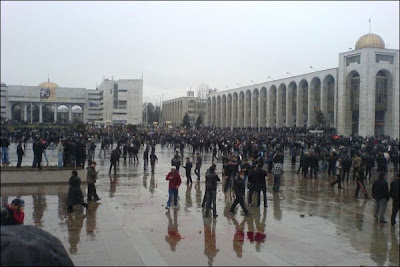
Protesters took control of a government office in Talas on April 6, and on April 7 clashes between protesters and police in the capital Bishkek turned violent. At least 65 deaths and 400 injuries have been confirmed. Overnight it was reported that President Bakiyev had fled the capital in his private jet south to Osh, and that opposition leaders were forming a new government led by former foreign minister Roza Otunbayeva.


Long-term frustration has been building in Kyrgyzstan over the perceived corruption and cronyism in the Bakiyev administration, as well as the country's poor economic situation and a recent rise in utility rates.





In the days leading up to the riots a number of news outlets were shut down, following reports that were considered "damaging" to the president and his son, Maxim Bakiyev, who heads the new national Central Agency for Development, Investment, and Innovation. An arrest warrant was issued in early March by an Italian court for Eugene Gourevitch, an American who was accused of defrauding Telecom Italia. Gourevitch was at the time the managing director of a consulting agency that advised Kyrgyzstan's Development Fund, which in turn is managed by the Central Agency run by Maxim. The government soon began closing independent news outlets that reported on Gourevitch affair. Two newspapers were shut down on March 18. Radio Azattyk, the Kyrgyz-language service of RFE/RL, went off the air shortly afterward. The opposition newspaper Forum was shut on March 31, and the independent website Stan.tv had its equipment removed on April 1.








UN Secretary General Ban Ki-moon arrived in Kyrgyzstan on April 3, and protesters gathered outside the UN's headquarters in the capital of Bishkek to inform Ban Ki-moon of the media situation. A small group of protesters then moved to the center of town, but were stopped by police.

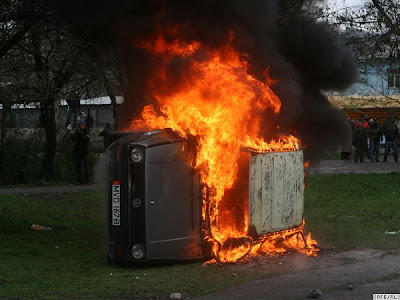
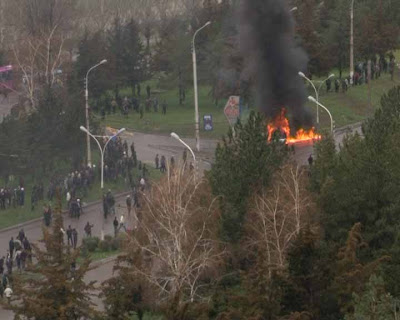



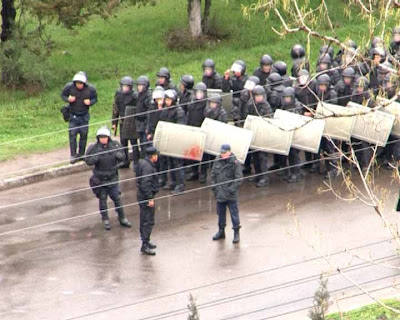


Some persons in the media are already suggesting that the riots in the country and the opposition claim of having taken over the government are akin the the Tulip Revolution in 2005.





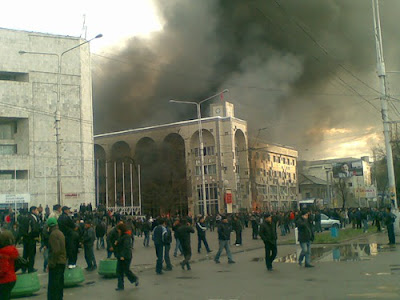
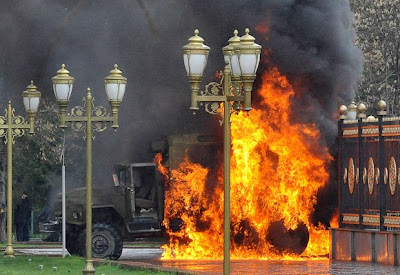


The riots stem from growing anger against the government of President Kurmanbek Bakiyev and the sluggish economy, and follow the government's closure of several media outlets.




Protesters took control of a government office in Talas on April 6, and on April 7 clashes between protesters and police in the capital Bishkek turned violent. At least 65 deaths and 400 injuries have been confirmed. Overnight it was reported that President Bakiyev had fled the capital in his private jet south to Osh, and that opposition leaders were forming a new government led by former foreign minister Roza Otunbayeva.


Long-term frustration has been building in Kyrgyzstan over the perceived corruption and cronyism in the Bakiyev administration, as well as the country's poor economic situation and a recent rise in utility rates.





In the days leading up to the riots a number of news outlets were shut down, following reports that were considered "damaging" to the president and his son, Maxim Bakiyev, who heads the new national Central Agency for Development, Investment, and Innovation. An arrest warrant was issued in early March by an Italian court for Eugene Gourevitch, an American who was accused of defrauding Telecom Italia. Gourevitch was at the time the managing director of a consulting agency that advised Kyrgyzstan's Development Fund, which in turn is managed by the Central Agency run by Maxim. The government soon began closing independent news outlets that reported on Gourevitch affair. Two newspapers were shut down on March 18. Radio Azattyk, the Kyrgyz-language service of RFE/RL, went off the air shortly afterward. The opposition newspaper Forum was shut on March 31, and the independent website Stan.tv had its equipment removed on April 1.








UN Secretary General Ban Ki-moon arrived in Kyrgyzstan on April 3, and protesters gathered outside the UN's headquarters in the capital of Bishkek to inform Ban Ki-moon of the media situation. A small group of protesters then moved to the center of town, but were stopped by police.









Some persons in the media are already suggesting that the riots in the country and the opposition claim of having taken over the government are akin the the Tulip Revolution in 2005.







Photos from:
telegraph.co.uk/news/picturegalleries/worldnews/7563698/Kyrgyzstan-unrest-in-pictures-state-of-emergency-declared-in-Bishkek-after-revolt.html
internews.kg/internewsnetwork/615-kyrgyzstan-mitings-oppozitsii-foto.html
novosti.kg/news/721.html
azattyk.org/photogallery/3824.html
novosti.kg/news/719.html
fotoden.info/gallery/1159/p/9
morrire.livejournal.com
AP
news.xinhuanet.com/english2010/world/2010-04/07/c_13241157.htm
news.xinhuanet.com/english2010/photo/2010-04/07/c_13241278_3.htm
reuters.com/article/slideshow?articleId=USTRE6351SF20100407#a=1
telegraph.co.uk/news/picturegalleries/worldnews/7563698/Kyrgyzstan-unrest-in-pictures-state-of-emergency-declared-in-Bishkek-after-revolt.html
internews.kg/internewsnetwork/615-kyrgyzstan-mitings-oppozitsii-foto.html
novosti.kg/news/721.html
azattyk.org/photogallery/3824.html
novosti.kg/news/719.html
fotoden.info/gallery/1159/p/9
morrire.livejournal.com
AP
news.xinhuanet.com/english2010/world/2010-04/07/c_13241157.htm
news.xinhuanet.com/english2010/photo/2010-04/07/c_13241278_3.htm
reuters.com/article/slideshow?articleId=USTRE6351SF20100407#a=1

